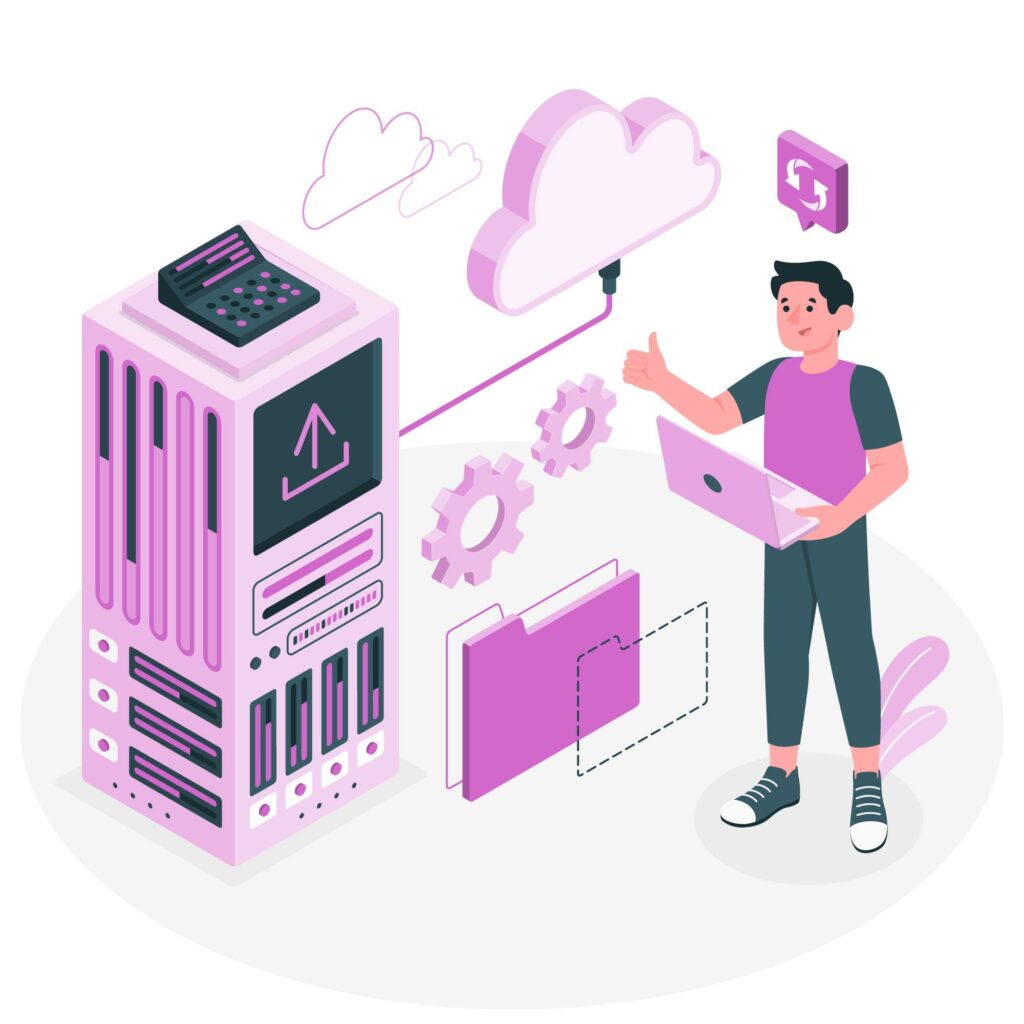Importance Of Cloud Based Software Development Tools
Cloud-based software development tools are vital cloud-hosted resources that empower developers to design, create, test, and deploy software applications without relying on traditional on-premise hardware or infrastructure. These tools have become widely used due to their flexibility, scalability, and ability to enhance collaboration across teams located in different areas.

1: Integrated Development Environments (IDEs)
Cloud-based IDEs enable developers to write, edit, debug, and execute their code directly in the cloud. These platforms offer a comprehensive environment similar to desktop IDEs, but with added advantages such as remote access, collaborative features, and resource sharing.

Examples:
- AWS Cloud9: A cloud-based IDE that supports multiple programming languages and integrates seamlessly with AWS services for streamlined development, testing, and deployment.
- Gitpod: Offers automated cloud-based development environments, accessible from any device, featuring pre-configured workspaces and continuous development support.
- Replit: A user-friendly cloud IDE that enables real-time coding, collaboration, and project sharing.
Benefits:
- Accessible from any device with internet connectivity, ensuring flexibility for users.
- Additionally, facilitates easier team collaboration, improving workflow efficiency.
- Eliminates the need for local installations, which speeds up setup time significantly.
- Furthermore, provides real-time updates and scalability, supporting dynamic project needs.
2: Version Control Systems (VCS)

Version control systems enable developers to track changes in their codebase, collaborate with team members, and manage various versions of the software under development. Cloud-based VCS platforms offer centralized repositories that facilitate code management, collaboration, and the maintenance of project histories.
Examples:
- GitHub: A popular cloud-based version control platform built on Git, offering collaboration features such as pull requests, code reviews, and integration with CI/CD pipelines.
- GitLab: A robust DevOps platform that combines version control, CI/CD, and project management tools within a single interface.
- Bitbucket: A Git-based VCS that integrates with Atlassian tools like Jira, enabling smooth project management.
Benefits:
- Supports simultaneous collaboration on the same codebase by multiple developers.
- Tracks all code changes, making it easy to revert to previous versions when needed.
- Seamlessly integrates with CI/CD pipelines for automated testing and deployment.
- Offers enhanced security and compliance features, particularly beneficial for larger enterprises.
3: Continuous Integration/Continuous Deployment (CI/CD) Tools

CI/CD tools streamline the process of testing, building, and deploying code by automating these tasks. They ensure that changes to the codebase are automatically tested and deployed to production without manual effort, resulting in a more efficient and error-free development process.
Examples:
- Jenkins: An open-source CI/CD tool that enables developers to automate every stage of the software development lifecycle, from code commits to production deployment.
- CircleCI: A cloud-based CI/CD tool that integrates with platforms like GitHub, GitLab, and Bitbucket to automate tests and deployments effortlessly.
- Travis CI: A widely-used CI tool for open-source projects that provides cloud-based automation for building, testing, and deploying code.
Benefits:
- Enables faster and more reliable releases by automating testing.
- Minimizes manual errors during deployment.
- Integrates smoothly with cloud platforms such as AWS, Azure, and Google Cloud.
- Provides immediate feedback on code changes.
4: Project Management and Collaboration Tools

These tools enable teams to monitor progress, manage tasks, and collaborate on projects in real time. Cloud-based project management platforms help development teams stay focused on project objectives and deadlines, ensuring smooth communication and transparency.
Example
- Jira: A popular project management tool for tracking software development projects, supporting agile methodologies like Scrum and Kanban, and integrating with Git, CI/CD tools, and cloud platforms.
- Trello: A visual task management tool that allows teams to organize projects using boards and lists, offering an intuitive interface for flexible workflows.
- Asana: A robust collaboration and project tracking tool that includes features such as task assignments, due dates, and progress tracking.
Benefits:
- Enables centralized management of development tasks, ensuring organized workflows.
- Additionally, supports real-time collaboration among team members, fostering effective communication.
- Facilitates transparent tracking of progress and deadlines, keeping projects on schedule.
- Moreover, enhances alignment with business objectives, promoting goal-oriented development.
5: Cloud Storage and Code Repositories

Cloud storage tools enable developers to securely store, manage, and share code, documentation, and other assets related to development projects. These tools offer scalable storage solutions with access controls and collaboration features, making them ideal for team-based projects.
Example
- Amazon S3 (Simple Storage Service): A scalable cloud storage service from AWS that stores large volumes of data, including code, backups, and logs.
- Google Cloud Storage: Provides highly durable, secure object storage with seamless integration into other Google Cloud services.
- Dropbox Business: Tailored for team collaboration, offering version control and file-sharing features alongside cloud storage.
Benefits:
- Ensures high availability and redundancy of stored data, while also enhancing reliability.
- Additionally, provides secure, scalable storage with access control options for better data management.
- Facilitates easy sharing and collaboration within teams, thereby improving productivity.
- Moreover, integrates with development workflows for efficient asset management.
6: Application Performance Monitoring (APM) Tools

These tools allow developers to track the performance of their applications in real time, pinpoint bottlenecks, and enhance overall performance. Cloud-based APM tools provide in-depth insights into how applications are running in production environments.
Examples:
- New Relic: A comprehensive cloud-based APM tool that monitors application performance, infrastructure, and customer experience in real time.
- Datadog: Offers cloud-scale monitoring for infrastructure, applications, and logs, with features like alerting and visualization dashboards.
- AppDynamics: Delivers detailed insights into application performance, user behavior, and cloud infrastructure, enabling proactive performance optimization.
Benefits:
- Firstly, real-time monitoring and alerting for immediate issue detection.
- Enhanced application uptime and performance.
- Thirdly, in-depth analytics for troubleshooting and performance optimization.
- Scalable to monitor both cloud-based and on-premise systems.
7: Containerization and Orchestration Tools
Containers offer a lightweight and portable environment for developing, testing, and deploying applications, ensuring consistency across various environments. Orchestration tools like Kubernetes are used to manage and scale these containers in cloud-based systems.
Examples:
- Docker: A leading platform for containerizing applications, ensuring consistent operation across different environments.
- Kubernetes: An orchestration tool that automates the deployment, scaling, and management of containerized applications.
- Amazon Elastic Kubernetes Service (EKS): A managed Kubernetes service that simplifies the deployment and management of containerized applications on AWS.
Benefits:
- Firstly, it simplifies the deployment of applications across multiple environments.
- It also enhances scalability and optimizes resource utilization.
- Improves application portability across different platforms.
- Finally, it supports microservices architecture and cloud-native development practices.
8: API Management Tools

These tools assist developers in creating, managing, and monitoring APIs, ensuring that they are secure, scalable, and well-integrated with cloud environments.
Examples:
- Postman: A tool for designing, testing, and managing APIs, offering features such as automated testing and API documentation generation.
- AWS API Gateway: A fully managed service that allows developers to create, publish, and secure APIs at scale.
- Apigee: Google’s API management platform that helps businesses design, secure, and scale APIs effectively.
Benefits:
- Simplifies API creation and management.
- Ensures scalability and high availability of APIs.
- Provides security features such as authentication and rate limiting.
- Easily integrates with backend services and cloud infrastructure.
9: Database Management and DevOps Tools

Cloud-based database management tools enable developers to manage and query databases without the need for manual server maintenance. These tools integrate with cloud platforms to ensure scalability, security, and data backups.
Examples:
- Amazon RDS (Relational Database Service): A managed database service supporting multiple databases, including MySQL, PostgreSQL, and SQL Server.
- MongoDB Atlas: A fully managed, cloud-native NoSQL database service offering scalability, flexibility, and support for large datasets.
- Google Firebase: A cloud-based platform for developing mobile and web applications, featuring integrated NoSQL databases, hosting, and authentication.
Benefits:
- Eliminates the need for manual database maintenance.
- Provides automated scaling, backups, and security measures.
- Ensures high availability and redundancy of data.
- Easily integrates with cloud-native applications for seamless operations.
[Want to learn more about cloud based software development tools? Click here to reach us.]
Conclusion
In conclusion, cloud-based software development tools have revolutionized the way developers design, build, and deploy applications. Offering unmatched flexibility, scalability, and collaboration capabilities, these tools enable teams to work seamlessly across locations while reducing the need for traditional infrastructure.
Whether it’s through cloud-based IDEs, version control systems, CI/CD tools, or container orchestration, developers can optimize their workflows and enhance productivity. As cloud technology continues to evolve, these tools will remain critical to delivering efficient, secure, and scalable software solutions in an increasingly digital world.
At Bobcares, our software development support services are designed to help businesses leverage these powerful tools effectively. We provide expert guidance and assistance to ensure that your development processes are streamlined, secure, and aligned with your business objectives, empowering you to focus on innovation and growth.







0 Comments